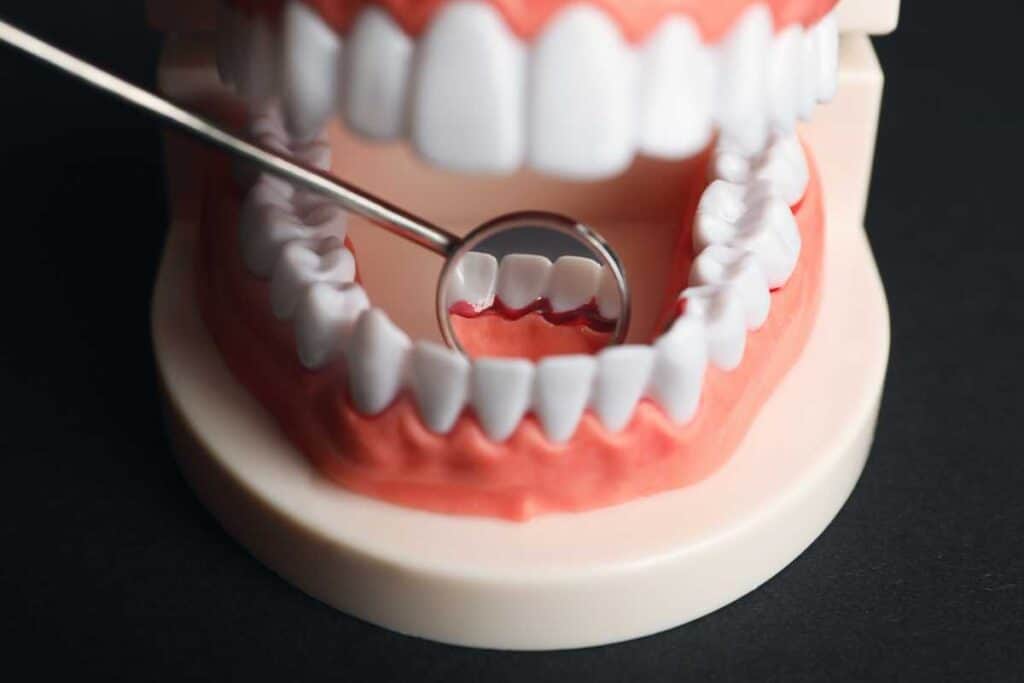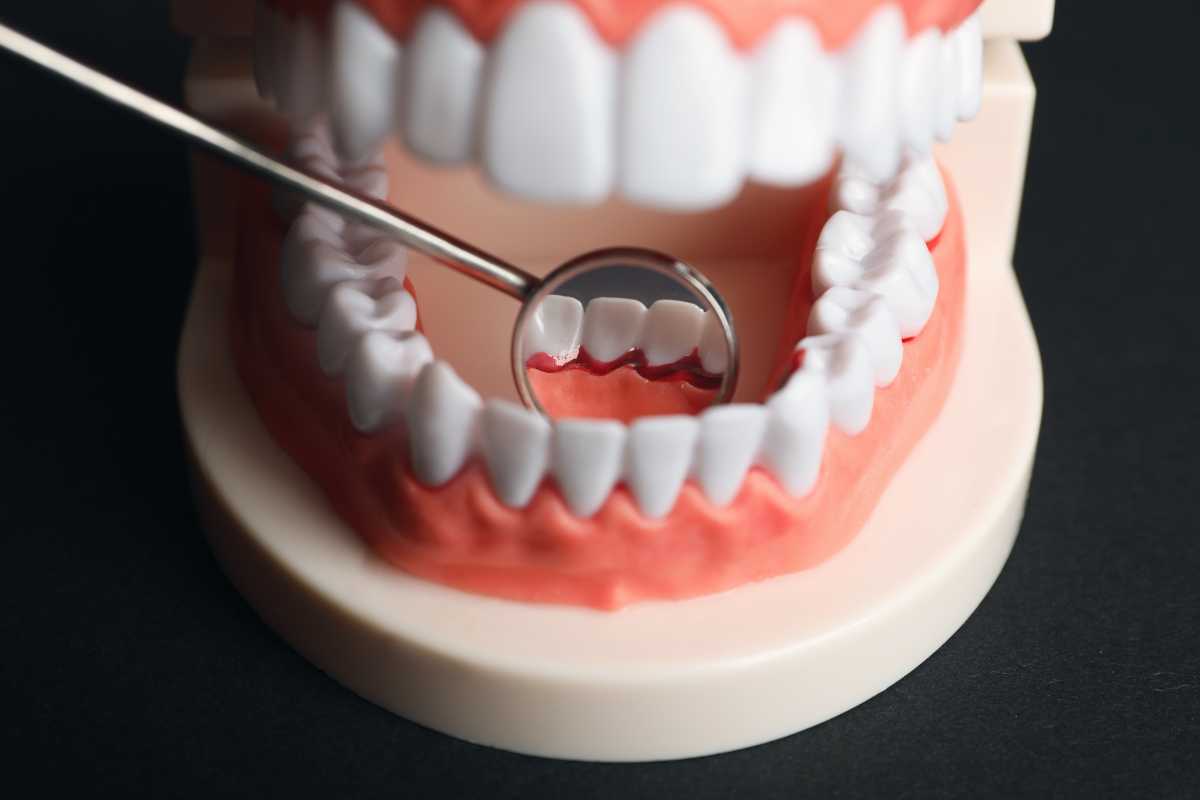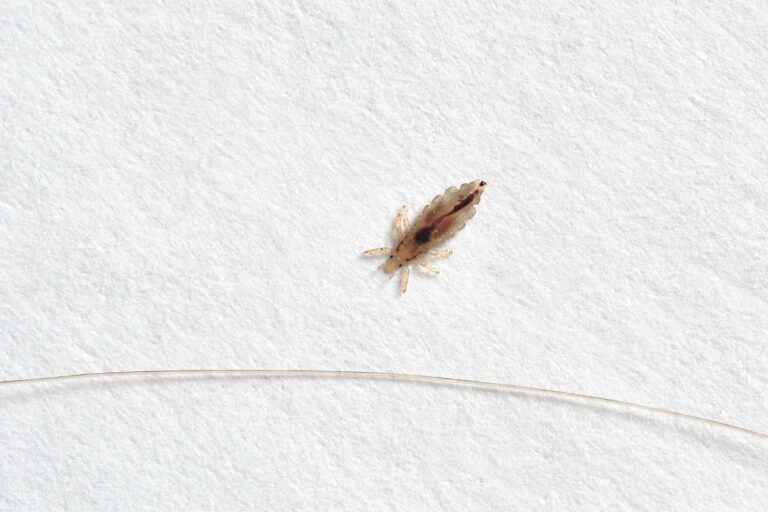Prophetic Medicine for Gum Disease: Preventive Siwak Treatment
Prophetic Medicine for Gum Disease: Preventive Siwak Treatment

The ancient wisdom of prophetic medicine holds valuable insights into various aspects of human health, including oral care. In particular, the use of natural remedies for treating gum disease has been a significant practice in prophetic medicine.
Gum disease, also known as periodontal disease, is a common condition that affects millions of people worldwide. It can lead to serious oral health issues if left untreated.
By exploring the historical significance of using natural remedies for oral health and understanding their relevance in modern dentistry, we can uncover alternative solutions to combat gum disease.
Prophetic medicine offers a unique perspective on treating this condition by utilizing herbs, oils, and other natural substances known for their therapeutic properties.
In this research paper, we will delve into the principles behind prophetic medicine’s approach to gum disease treatment. We will examine the effectiveness of these natural remedies and their potential integration with conventional dental practices.
By doing so, we hope to shed light on how prophetic medicine can contribute to holistic oral healthcare.
Food that can cause gum disease:
| Food | Explanation |
|---|---|
| Sugary foods | Consuming excessive sugar can lead to plaque buildup and increase the risk of gum disease. |
| Sticky foods | Sticky foods tend to stay on the teeth longer, increasing the chances of bacteria growth and gum disease. |
| Acidic foods | Acidic foods can erode tooth enamel, making the gums more susceptible to infection and gum disease. |
| Starchy foods | Starchy foods can get trapped between teeth, providing a breeding ground for bacteria and leading to gum disease. |
| Carbonated drinks | Carbonated drinks are often high in sugar and acid, both of which can contribute to gum disease. |
| Alcohol | Alcohol can dry out the mouth, reducing saliva production and increasing the risk of gum disease. |
| Citrus fruits | Citrus fruits are acidic and can irritate the gums, potentially leading to gum disease. |
| Dried fruits | Dried fruits are sticky and high in sugar, making them harmful to dental health and increasing the risk of gum disease. |
| Processed foods | Processed foods often contain high amounts of sugar and unhealthy fats, which can contribute to gum disease. |
| Coffee | Coffee can stain teeth and cause bad breath, but it can also contribute to gum disease if consumed excessively. |
“Explore our latest articles on Prophetic Medicine to discover simple, natural remedies that can improve your health. Check them out now and start feeling better!“
Siwak: The Preventive Power
Siwak, also known as miswak or siwaak, is a natural toothbrush that has been used for centuries to prevent gum disease. Its effectiveness lies in its antibacterial properties, which promote oral hygiene and help maintain healthy gums. Let’s delve into the various aspects of siwak and how it can benefit your dental health.
Siwak’s antibacterial properties are a result of the compounds present in the stick. Studies have shown that siwak exhibits inhibitory activity against several bacteria strains commonly found in the mouth.
This inhibitory activity helps reduce the risk of gum disease by preventing bacterial growth and maintaining a balanced oral environment.
In addition to its antimicrobial effects, siwak’s mechanical action plays a crucial role in preventing gum inflammation. When used as a toothbrush, the bristles of siwak effectively remove plaque from teeth surfaces and stimulate blood circulation in the gums.
This mechanical action not only aids in plaque removal but also helps prevent tartar buildup, which can lead to gum disease if left untreated.
The cultural and religious significance of siwak further adds to its appeal in prophetic medicine. Siwak holds great importance within Islamic traditions as it is considered part of the sunnah (the sayings and actions of Prophet Muhammad).
In Sahih Muslim, there is mention of Prophet Muhammad stating, “If I had not found it difficult for my followers or the people, I would have ordered them to clean their teeth with siwak before every prayer.” This statement highlights the significance placed on oral hygiene using siwak within Islamic teachings.
Moreover, using siwak aligns with modern scientific understanding regarding oral health. It acts as an effective tool for maintaining good dental hygiene by reducing harmful bacteria and promoting healthy gums. By incorporating this practice into your daily routine, you can benefit from both its cultural significance and scientific evidence.
To make the most of siwak’s preventive power, it is important to use it correctly. Start by moistening the stick and gently chew on one end until the bristles separate into fibers. Then, brush your teeth in a circular motion, ensuring that all tooth surfaces are covered. After each use, rinse the siwak thoroughly and allow it to dry before storing it in a clean place.
Therapeutic Effects of Miswak for Gum Disease
Reducing Gum Inflammation and Bleeding
Miswak, a natural oral hygiene tool, has been recognized for its therapeutic benefits in treating gum disease. One of the key advantages of using miswak is its ability to reduce gum inflammation and bleeding.
The bristles of the miswak contain natural compounds that possess anti-inflammatory properties, aiding in soothing irritated gums. Regular use of miswak can help alleviate discomfort caused by inflamed gums, making it an effective remedy for those suffering from gum disease.
Combating Bacterial Growth in the Mouth
The natural compounds present in miswak not only reduce inflammation but also combat bacterial growth in the mouth. Scientific studies have shown that miswak contains antibacterial agents such as salvadorine and trimethylamine that effectively inhibit the growth of harmful bacteria responsible for gum disease.
These compounds work by disrupting the biofilm formation on teeth, preventing plaque buildup and reducing the risk of infection. By incorporating miswak into your oral hygiene routine, you can naturally combat bacterial growth and maintain a healthier mouth.
Strengthening Gums and Promoting Overall Oral Health
In addition to its anti-inflammatory and antibacterial properties, miswak also plays a crucial role in strengthening gums and promoting overall oral health. The act of chewing on miswak stimulates blood circulation in the gums, enhancing their strength and resilience. This stimulation encourages proper nutrient flow to the gum tissues, supporting their regeneration process and promoting healthy gum tissue development. By regularly using miswak as part of your oral care regimen, you can strengthen your gums and improve your overall oral health.
Effectiveness in Treating Various Stages of Gum Disease
Several studies have highlighted the effectiveness of miswak in treating various stages of gum disease. Research conducted on individuals with gingivitis showed significant improvements after regular use of miswak.
The anti-inflammatory and antibacterial properties of miswak aid in reducing gum inflammation, controlling bacterial growth, and preventing the progression of gingivitis to more severe forms of gum disease.
Furthermore, miswak has been found to be beneficial in managing periodontitis by promoting gum tissue healing and reducing pocket depths. Its natural compounds provide a holistic approach to treating gum disease at different stages.
Integrating Ancient Wisdom and Modern Approaches in Gum Disease Treatment
Gum disease, also known as periodontal disease, is a common oral health issue that affects millions of people worldwide. It can lead to various complications such as gingival recession, tooth loss, and even systemic diseases if left untreated.
While modern dental practices have made significant advancements in treating gum disease, there is a growing recognition of the importance of integrating traditional remedies, particularly prophetic medicine techniques, to enhance conventional treatments.
Understanding the importance of combining traditional remedies with modern dental practices
Traditional remedies have been used for centuries to address various ailments, including oral health issues. Prophetic medicine refers to the healing methods mentioned in ancient texts like the Quran and Hadiths. These remedies often involve natural ingredients and holistic approaches that can complement modern dental practices.
Exploring how incorporating prophetic medicine techniques can enhance conventional treatments for gum disease
One area where prophetic medicine techniques can be beneficial is in plaque removal. While modern toothbrushes are effective at cleaning teeth and gums, they may not always reach every nook and cranny along the gum line.
Traditional methods like using a miswak (a teeth-cleaning twig from the Salvadora persica tree) have been found to provide additional benefits by reducing plaque buildup and combating bacteria associated with gum disease.
Moreover, certain natural substances mentioned in prophetic medicine, such as honey or black seed oil, possess antimicrobial properties that can help fight against harmful bacteria like Candida albicans commonly found in the oral cavity.
Learning about holistic approaches that integrate ancient wisdom into contemporary dental care
Holistic approaches focus on treating the patient as a whole rather than just addressing specific symptoms or conditions. In the context of gum disease treatment, this means considering factors beyond oral hygiene alone. Prophetic medicine emphasizes maintaining a healthy lifestyle through proper nutrition and self-care practices that support overall well-being.
For instance, a balanced diet rich in nutrients can strengthen the immune system and promote gum health. Incorporating prophetic foods such as dates, figs, and pomegranates, known for their potential benefits in preventing gum disease, can be part of a comprehensive treatment plan.
Discovering how a comprehensive treatment plan can optimize results for patients with gum disease
To effectively manage gum disease, it is crucial to develop a comprehensive treatment plan that combines modern approaches with traditional remedies. This may involve regular dental cleanings, scaling and root planing procedures performed by professionals to remove plaque and tartar buildup below the gum line.
Integrating prophetic medicine techniques like using a miswak or natural mouth rinses made from herbs mentioned in ancient texts can provide supplementary benefits. These approaches not only aid in maintaining oral hygiene but also contribute to overall oral health by reducing inflammation and promoting healing.
Prophetic Medicine: Fusing Old with New Techniques
Prophetic medicine, a practice that combines traditional remedies with evidence-based modern techniques, offers an intriguing approach to treating various ailments.This fusion of ancient knowledge and advancements in dental science can yield promising outcomes.
By integrating prophetic medicine principles into mainstream healthcare practices, we can explore innovative ways to effectively treat gum disease.
One of the key aspects of prophetic medicine is its reliance on remedies that have been mentioned by the Prophet himself or have roots in ancient traditions.
These time-tested remedies have been passed down through generations and continue to be valued for their potential health benefits. However, it is important to note that while these remedies hold historical significance, they should also be subjected to rigorous scientific scrutiny.
Clinical trials play a vital role in bridging the gap between traditional medicine and evidence-based practices. By conducting clinical trials on prophetic medicines used for gum disease treatment, researchers can evaluate their efficacy and safety.
These trials involve testing different agents derived from natural sources such as herbs and oils to determine their impact on gum disease symptoms.
For instance, a recent study explored the effects of certain prophetic medicine extracts on gum disease-causing microbes. The results indicated that specific plant extracts possessed antimicrobial properties that could potentially aid in combating these harmful microorganisms.
Such findings pave the way for further research and development of prophetic medicine-based treatments for gum disease.
In addition to clinical trials, understanding the recipe behind these traditional remedies is crucial. Ancient texts often provide detailed instructions on how to prepare these medicines using natural ingredients readily available during those times.
By deciphering these recipes and extracting key components responsible for therapeutic effects, scientists can create standardized formulations suitable for modern use.
Talbinah, a popular porridge-like dish mentioned in historical texts as having medicinal properties, presents an interesting example here. Researchers have identified certain compounds present in talbinah that exhibit anti-inflammatory effects.
Incorporating talbinah or its extracts into modern dental care products may offer a novel approach to alleviate gum pain and reduce inflammation.
By embracing the fusion of old and new techniques, we can tap into the vast potential of prophetic medicine for treating gum disease. This integration allows us to leverage ancient wisdom while benefiting from evidence-based practices.
It is important to note that prophetic medicine should not be seen as a standalone solution but rather as a complementary approach that can enhance mainstream healthcare practices.
Enhancing Oral Health with Prophetic Medicine Practices
Maintaining optimal oral health is crucial for overall well-being. The teachings of the Prophet Muhammad provide valuable insights into prophetic medicine practices that can help improve oral hygiene and prevent gum disease.
By incorporating these natural remedies and dietary recommendations, individuals can promote a healthier oral cavity and enjoy the benefits of enhanced oral health.
Practical Prophetic Medicine Practices for Improved Oral Hygiene
Prophetic medicine offers practical solutions to enhance oral health and combat gum diseases. One such practice is Miswak, a traditional tooth-cleaning twig recommended by the Prophet Muhammad.
Miswak not only cleanses the teeth but also possesses antibacterial properties that inhibit the growth of harmful bacteria in the mouth.
Using an organic toothpaste infused with natural ingredients like neem or cloves can provide further protection against gum diseases. These ingredients have been recognized for their antimicrobial properties, promoting healthy gums and preventing infections.
Natural Remedies Recommended by the Prophet Muhammad
The Prophet Muhammad recommended several natural remedies to maintain healthy gums. One such remedy is rinsing the mouth with saltwater. Saltwater has antiseptic properties that help reduce inflammation and kill bacteria in the oral cavity, contributing to improved gum health.
Another effective remedy is using honey as a topical application on affected areas. Honey possesses antioxidant activity and antimicrobial properties, which can aid in healing gum inflammation and reducing pain.
Dietary Recommendations for Optimal Oral Health
Prophetic medicine emphasizes the significance of dietary choices in promoting oral health. Consuming foods rich in bioactive components such as fruits, vegetables, and whole grains can contribute to stronger gums and teeth. These foods are packed with essential vitamins, minerals, and antioxidants that support overall dental care.
Moreover, incorporating specific foods recommended by prophetic medicine practices can be beneficial. For instance, consuming milk has been associated with lower levels of lactobacillus acidophilus and escherichia bacteria, which are known to contribute to gum diseases.
Similarly, ethyl acetate extracts found in certain fruits and vegetables have shown promising results in inhibiting the growth of harmful oral bacteria.
The Holistic Approach to Well-being
Oral health is an integral part of overall well-being, and prophetic medicine recognizes this interconnectedness. By adhering to the teachings of the Prophet Muhammad regarding oral hygiene, individuals can experience not only improved dental health but also a positive impact on their general well-being.
Scientific Evidence: Effectiveness of Prophetic Medicine for Gum Disease
Several scientific studies have shed light on the efficacy of prophetic medicine in treating gum disease. These studies provide evidence-based research supporting the use of natural remedies and techniques recommended by Prophet Muhammad (peace be upon him) for maintaining optimal oral health.
One area of focus in these studies has been the antibacterial effects of siwak and miswak, two traditional tools used for oral hygiene.
Siwak is a twig from the Salvadora persica tree, while miswak refers to any type of teeth-cleaning twig. Research findings have shown that both siwak and miswak possess potent antimicrobial properties, making them effective in combating bacteria responsible for gum diseases.
In various laboratory experiments, siwak and miswak extracts have exhibited significant antibacterial activity against common oral pathogens such as Streptococcus mutans, Porphyromonas gingivalis, and Aggregatibacter actinomycetemcomitans.
These studies suggest that the regular use of siwak or miswak can help prevent bacterial growth in the mouth, leading to improved gum health.
Clinical trials have also demonstrated the positive effects of prophetic medicine techniques on gum disease treatment.
For instance, a randomized controlled trial conducted on individuals with chronic periodontitis found that using a combination of siwak chewing sticks and conventional dental therapy led to a significant reduction in clinical parameters associated with gum inflammation.
The group utilizing prophetic medicine techniques showed improvements in pocket depth reduction and attachment gain compared to those receiving only conventional treatment.
Another study investigated the antimicrobial activity of honey as recommended by Prophet Muhammad (peace be upon him). The results revealed that honey exhibited strong inhibitory effects against various bacteria commonly found in dental plaque, including Streptococcus faecalis and Pseudomonas aeruginosa.
This suggests that incorporating honey into oral hygiene practices may contribute to the prevention and management of gum disease.
The therapeutic effects of prophetic medicine for gum disease have been further validated by numerous scientific studies. These findings support the integration of natural remedies and techniques into modern dental care, emphasizing their potential as adjunctive treatments or preventive measures for maintaining optimal gum health.
Harnessing the Power of Prophetic Medicine for Healthy Gums
We discussed the preventive power of Siwak and its therapeutic effects on gum disease. Furthermore, we highlighted the importance of integrating ancient wisdom with modern approaches to gum disease treatment, emphasizing how prophetic medicine can complement conventional techniques.
By incorporating prophetic medicine practices into your oral health routine, you have the opportunity to enhance your gum health and prevent future dental issues.
The scientific evidence supporting the effectiveness of prophetic medicine for gum disease further validates its potential as a valuable addition to your oral care regimen. So why not take advantage of these ancient remedies backed by modern research?
We encourage you to explore the world of prophetic medicine and consult with dental professionals who are knowledgeable about its application in oral healthcare. Remember, maintaining healthy gums is crucial for overall wellness, and harnessing the power of prophetic medicine can be a proactive step towards achieving optimal oral health.
Frequently Asked Questions (FAQs)
Can I use prophetic medicine as a standalone treatment for gum disease?
While prophetic medicine offers potential benefits for gum disease, it is important to note that it should not replace professional dental care. Prophetic medicine practices can be used as complementary measures alongside regular visits to your dentist and following their recommended treatment plan.
How often should I use Siwak or Miswak for preventive purposes?
Using Siwak or Miswak daily is generally recommended for preventive purposes. Incorporating this practice into your oral hygiene routine can help maintain good gum health and prevent various dental issues.
Are there any side effects associated with using prophetic medicine for gums?
When used correctly, there are usually no significant side effects associated with using prophetic medicine practices such as Siwak or Miswak for gums. However, it’s always a good idea to consult with your dentist or healthcare provider if you have any concerns or specific medical conditions.
Can prophetic medicine completely cure gum disease?
Prophetic medicine practices can contribute to the management and prevention of gum disease, but they may not provide a complete cure on their own. It is essential to work closely with dental professionals who can design a comprehensive treatment plan tailored to your specific needs.
How long does it take to see results when using prophetic medicine for gum disease?
The time it takes to see results when using prophetic medicine for gum disease may vary depending on the individual and the severity of the condition. Consistency in practicing prophetic medicine techniques, along with professional dental care, can help improve gum health over time.







